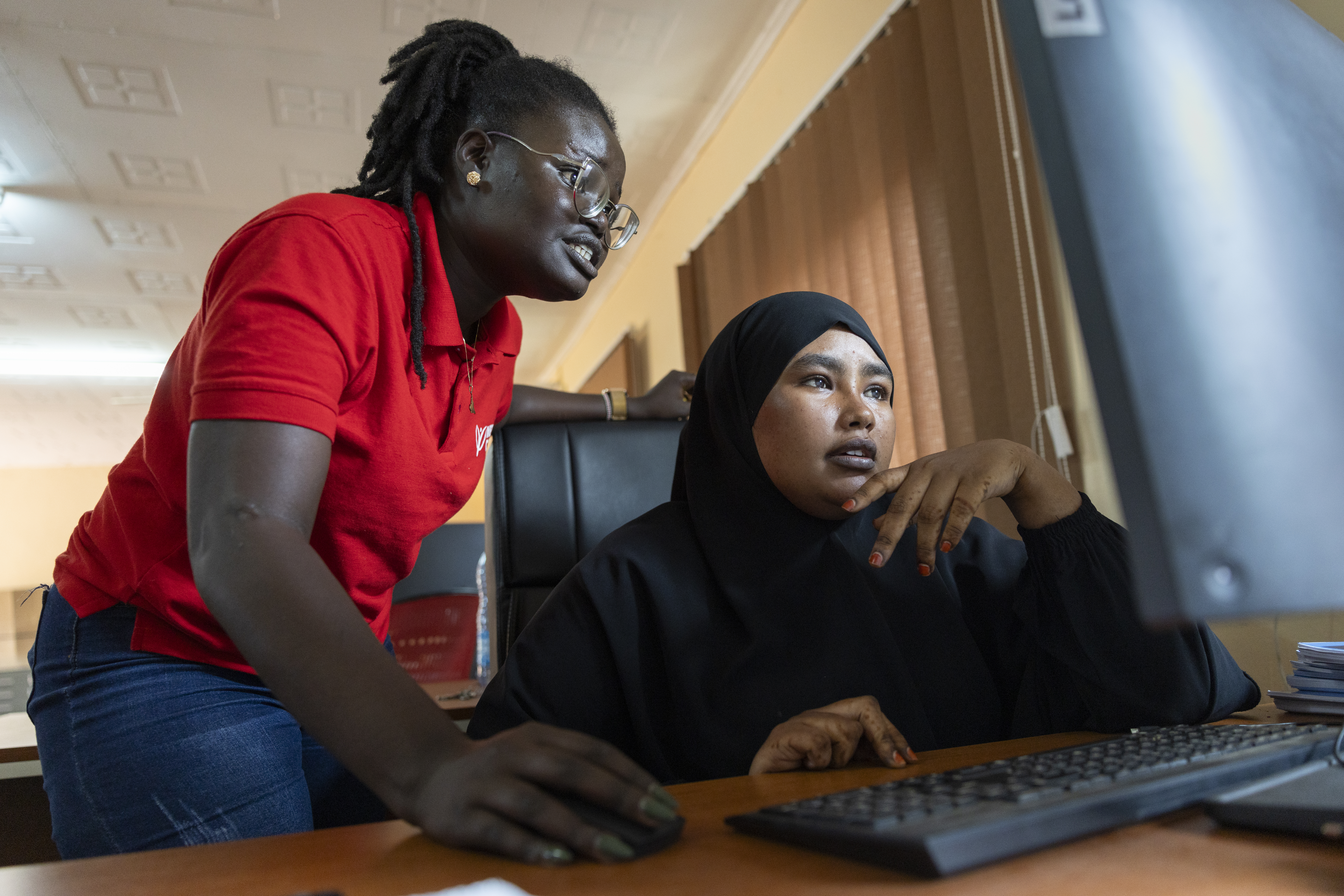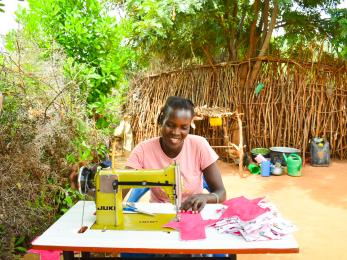From DREAMS to reality: A journey of self-reliance
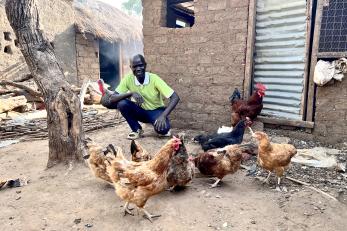
In Yumbe, Uganda, Nixon raises hundreds of day-old chicks. When the chicks are this young, Nixon’s days are filled with a chorus of light chirps. He is focused on tending to the hatchlings—feeding, watering, and making sure they are safe and healthy in their pen. He raises the chicks for a month before bringing them to market, where he sells them to farmers in his community in the Bidibidi Refugee Settlement. “This business is a business that I'm going to keep for the rest of my life,” said Nixon.
Nixon is one of 1.5 million refugees now living in Uganda. In late 2016, Nixon and his family fled violence in South Sudan and arrived at the Bidibidi Refugee Settlement in rural northwestern Uganda, where nearly 200,000 refugees have relocated. Like many refugees who found their way to Bidibidi Camp, Nixon and his family’s stay stretched from months into years.
Humanitarian networks are struggling to keep pace with the growing needs of displaced populations globally. Aid budgets and food rations are shrinking, leaving refugees vulnerable to poverty and food insecurity. In Uganda—host of one of the largest refugee populations in the world—the World Food Program has had to cut food rations to refugees several times since 2020. As humanitarian funding decreases, it’s essential for refugee communities to build more sustainable livelihoods in order to not rely on inconsistent aid.
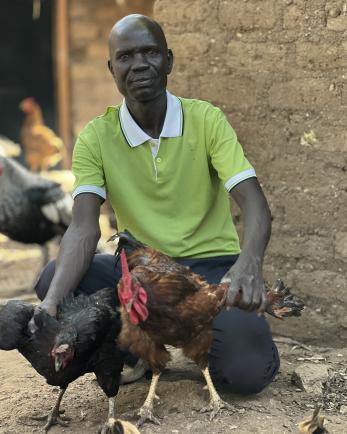
Despite facing significant barriers, refugees like Nixon are building their own path of self-reliance. Nixon’s passion for farming and livestock led him to pursue an agriculture business in Uganda. “In South Sudan I was a farmer,” said Nixon, who was a civil engineer in his home country. “When I got leave [from my job], I would go to the farm. I enjoyed my crops, and my animals. It is wonderful for me to have them.”
Based on his farming experience and drive, Nixon was trained by a poultry supply company, Chick Masters Limited, to become a Mother Unit Operator. In this specialized role, Nixon’s business is a critical link that raises chicks to maturity so they can be sold to farmers. He received subsidies for the first three orders of chicks to kickstart his business. Through this support from the DREAMS (Delivering Resilient Enterprises and Market Systems) program by Mercy Corps and Village Enterprise, Nixon increased his income and reinvested his own funds into additional batches of chicks, growing his business and creating stability for himself and his family.
DREAMS supports growing markets for refugee businesses to thrive
The DREAMS program is a scalable model of assistance that fills critical gaps in the humanitarian system so refugees can move from basic survival to self-reliance. Through our partnership with Village Enterprise, a nonprofit dedicated to ending extreme poverty in rural Africa, DREAMS provides the skills, connections, and capital to support refugees as they establish businesses while also engaging local markets to build a network where refugee entrepreneurs can succeed. Mercy Corps’ distinct approach to developing market systems works directly with established businesses, like Chick Master Limited, to improve the delivery and quality of goods and services to these refugee communities allowing their businesses to flourish.
Simultaneously, Village Enterprise works with refugees in the community, providing business training and mentorship and delivering seed funding so they can start a business. It is these farmers who eventually buy chicks from Mother Unit Operators like Nixon. Over time, as farmers who sell and buy chicks begin to generate profits, the support they receive from DREAMS is gradually reduced, and they are incentivized to reinvest in the growth of their businesses.
I use my profits to keep pushing my business.
Nixon, DREAMS participant
Nixon has significantly increased his income and reinvested his own funds into additional batches of chicks. His sales have grown from 250 chicks in the first batch to nearly 1,000 in his latest—the eighth batch he has purchased. This income has allowed him to diversify, investing in crops and goats, and to provide more food and pay school fees for his children. Together with his wife, they are caring for 19 children, including nieces and nephews who have lost their parents. Nixon shared that their monthly food rations decreased to just three kilos of cereal per person, but he is earning enough to feed his family despite these cuts.
“Currently I am running two businesses,” said Nixon. “The crop production and the poultry business. This poultry business is the one supporting my crop production. I use my profits to keep pushing my business.”
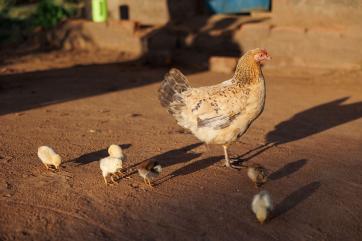
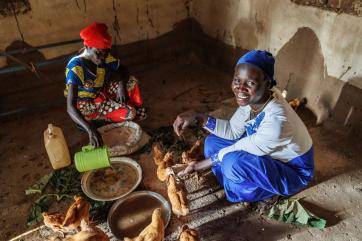
DREAMS continues to evolve and scale for the future
DREAMS emerged from years of working with and listening to the refugees as they shared how traditional humanitarian approaches failed them. Refugee participants are at the forefront of decision-making, providing strong community feedback to guide and adjust the program as it scales. At every level, Mercy Corps and our partners work with local program leaders who deeply understand the nuance of their contexts, including refugees themselves. Business mentors and private sector partners are from refugee settlements and local communities, creating opportunities for those who have been displaced to advocate for themselves.
Across Uganda and Ethiopia, DREAMS has trained over 9,600 entrepreneurs who launched more than 3,200 businesses—transforming 64,000 lives. DREAMS is on track to reach 340,000 people across East Africa and has the potential to support millions more. As DREAMS continues to scale and adapt for communities who are affected by conflict and climate change, we will be providing mental health support and addressing the unique and specific needs of women and girls. More sustainable livelihood assistance goes beyond business training and seed money—DREAMS is supporting a pathway for refugees to flourish as their whole selves.
The future of DREAMS is bright. Refugee communities are building more resilient livelihoods. Nixon hopes to become a veterinarian, to help share his knowledge with his community so they may all thrive with healthy animals and healthier businesses. Nixon explained that his poultry business is growing because other people’s livelihoods are improving as well. “My market comes from the community,” said Nixon.
DREAMS makes headlines
- DREAMS was the recipient of Fast Company’s 2023 World Changing Ideas Awards for the Europe, Middle East, and Africa category. The DREAMS program model was recognized for its impact, design, scalability, and ingenuity in the pursuit of good.
- Dawa, Salome, and Stella—three refugees who’ve built successful businesses through DREAMS—were featured on BBC World Service. Listen to the episode to hear their stories.

